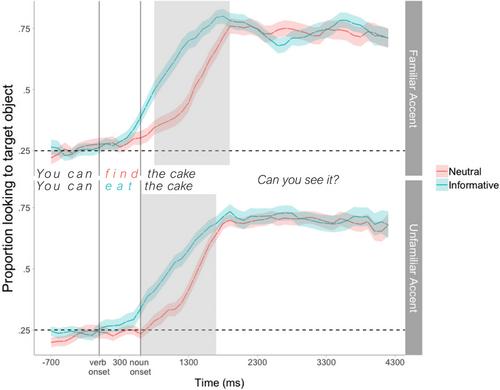Preschoolers benefit from sentential context in familiar- and unfamiliar-accented speech
Abstract
To learn the meaning of a new word, or to recognize the meaning of a known one, both children and adults benefit from surrounding words, or the sentential context. Most of the evidence from children is based on their accuracy and efficiency when listening to speech in their familiar native accent: they successfully use the words they know to identify other words’ referents. Here, we assess how accurately and efficiently 4-year-old children use sentential context to identify referents of known and novel nouns in unfamiliar-accented speech, as compared to familiar-accented speech. In a looking-while-listening task, children showed considerable success in processing unfamiliar-accented speech. Children robustly mapped known nouns produced in an unfamiliar accent to their target referents rather than novel competitors, and they used informative surrounding verbs (e.g., “You can eat the dax”) to identify the referents of both known and novel nouns—although there was a processing cost for unfamiliar-accented speech in some cases. This demonstrates that 4-year-olds successfully and rapidly process unfamiliar-accented speech by recruiting the same strategies available to them in familiar-accented speech, revealing impressive flexibility in word recognition and word learning across diverse linguistic environments.
Research Highlights
- We examined 4-year-old children's accuracy and processing efficiency in comprehending known and novel nouns embedded in sentences produced in familiar-accented or unfamiliar-accented speech.
- Children showed limited processing costs for unfamiliar-accented speech and mapped known words to their referents even when these were produced in unfamiliar-accented speech.
- Children used known verbs to predict the referents of upcoming nouns in both familiar- and unfamiliar-accented speech, but processing costs were evident for unfamiliar-accented speech.
- Thus, the strategies that support children's word comprehension and word learning in familiar-accented speech are available to them in unfamiliar accents as well.


 求助内容:
求助内容: 应助结果提醒方式:
应助结果提醒方式:


